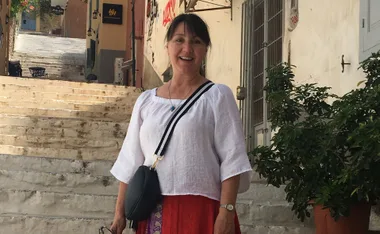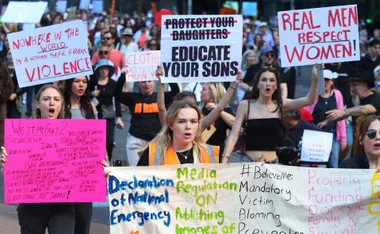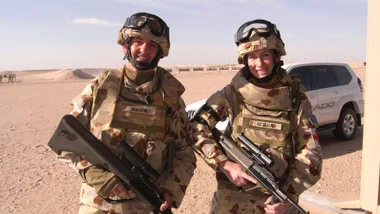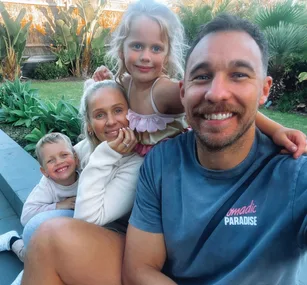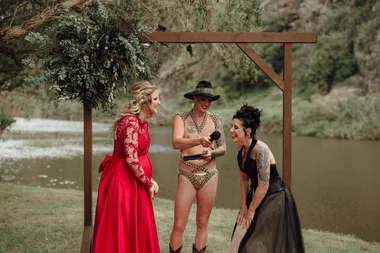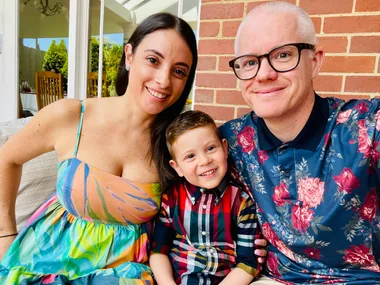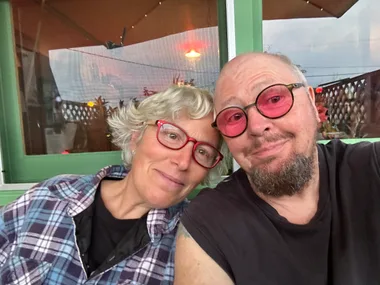Australia has one of the highest per capita child abduction rates in the world. As many as 15 children are snatched by one or other of their parents each week, but as campaigner Amanda Sillars tells Beverley Hadgraft, few consider the emotional and psychological damage children may suffer as a result.
Amanda Sillars was 11 and watching early morning cartoons when there was a knock at the door. As she undid the security latch, it burst open, big hands grabbed her hard and Amanda was thrown into the back of a car. “Go! Go! Go!” a voice yelled.
It was Amanda’s father, ripping her away from her mother and a loving family and community in Perth to abduct her and vanish overseas.
Her mum, still asleep in bed, had barely rubbed the sleep from her eyes and begun to wonder what the commotion was about before her little girl was gone, speeding across the city to an unknown destination and future, still dressed in pyjamas.
It would take seven emotionally scarring years before mother and daughter were eventually reunited.

Amanda and her brother as children.
Today, Amanda, 43, is a mature woman with a life and children of her own. She lives on four hectares just outside Brisbane. Her gardens are filled with fruit trees, horses graze in the paddocks, a blackboard on the wall bears one word: Love.
That word represents so much in Amanda Sillars’ life – it’s the pillar that most of us found our lives upon, the rock that gives us comfort in times of trouble and confidence in despair.
Equally, for Amanda, that single word also represents all that happens when parental love, whatever its form, suddenly vanishes from a young life.
“It was on the house when I moved in and I’ve kept it there because it encapsulates why I’m here,” she says.
“We all need love and we all need love from the people who love us.
That love shapes who we are and who we become as human beings. That’s what happens between parents and children. But it also represents what goes missing in a child’s life when that love disappears for whatever reason.”
The consequences for children caught in the middle of Australia’s often bitter, but all too common, custody battles can be dire indeed.
The emotional impact of separation from one parent or the other – usually after months or even years of acrimonious dispute between parties – can be deep and long lasting, especially if one parent, in desperation or an act of revenge, abducts the child.
One only has to look as far as the Sally Faulkner story that went so disastrously wrong for the Nine Network’s 60 Minutes team in recent months to see how children often become the silent victims.
Yet those children are far from alone. Each week in Australia, two children are abducted and taken overseas by one of their parents. That statistic is frightening enough, but inside Australia’s borders, the rates of parental abduction are at epidemic proportions, with an additional 650 abductions per year. In total, 15 children are abducted each week.
“Abduction isn’t a custody issue,” says Amanda Sillars.
“It’s psychological child abuse.”

Amanda with one of her horses on her Queensland property. She runs a support group for abductees.
The beginning of a cycle…
Amanda’s home is idyllic, a far cry from the horrors of her childhood that saw her manipulated by her dad, cut off from her mum and left to battle depression, obsessive behaviours, eating disorders and an inability to form relationships. Other children like her, she says, have numbed their anguish with drink, drugs and most tragic of all, suicide.
Today, Amanda runs a support group providing information about the heartbreak that is parental abduction and its psychological sister, parental alienation.
Abduction, says Amanda, is the most extreme form of alienation, but it can also extend to children who come to believe a parent is too dangerous or inept to take care of them – children who may even live in the same town as their parent yet refuse to have anything to do with them.
Amanda’s own nightmare began about a year after her parents’ divorce. She was close to her mum, Nola, and the pair loved joking around, drawing or making things together. Nola had never said a bad word about her ex-husband, Ian, so Amanda was bewildered when he snatched her away.
“He took me straight to a shopping centre,” she recalls. “He bought me new clothes – a pink jumper and a cream sparkly shirt – so I went from feeling scared to feeling spoiled.”
They initially flew to Sydney and Amanda asked if her mum was okay and if she could see or speak to her.
“I could see that didn’t please Dad. He kept repeating very negative things about Mum and because children trust their parents, I believed him.”
Before long, she was telling others what her father had told her, “Mum didn’t look after me. She was a bad person.” Inside, though, she was hurting so badly she’d slice her little legs with the edge of a metal ruler until they bled.
Seven months later, whisked off to live in America, it became obvious it wasn’t parental love that had driven her dad to take Amanda away. He’d disappear for entire weekends leaving her alone with her brother, Mark (who’d been lured to his dad’s a year earlier).
If she asked if they could go home to see Mum for Christmas, she was told she had a new life and boyfriend now. If she asked to put up a photo of her mum, her dad crossly pointed out they had their own family photos.
If she said she missed other family members, he would become exasperated and make her feel ungrateful. “Look where we live!” he would say. “This is California!”
“When I heard nothing from Mum, it confirmed again what Dad told me. She wasn’t a good mum,” Amanda says. “I didn’t realise she was hiring investigators to find us.”
Her eyes well-up as she recounts the one all-too-short moment, aged 13, that she did hear Nola’s voice. She can even still recall the phone number she announced as she picked up the receiver: “Hello, 9-0-2 triple 9.”
“Hello? Is that Mandy?” her mum asked. “I couldn’t speak,” Amanda says. “I heard her crying and didn’t know how to deal with it, so I put the phone down.”

Amanda’s father, Ian, (left) refused to let her have a photo of her mum, Nola (right), in their home.
For the next five years, Amanda went into survival mode, studying and exercising obsessively. “I felt I’d lost myself. It was hard for me to even think for myself, Dad was so full-on. I felt I had no identity at all.”
She shakes her head. “I still don’t know if he thought he was the better parent or whether he simply wanted to destroy Mum, but parents who take children away [without reason] have serious mental health issues. They don’t think about the impact they’re having on those children at all.”
Amanda was 18 when her dad announced they were returning to Australia. Excited, she dialled her mum’s phone number and they arranged to meet. On television, such reunions are the stuff of tears and tender embraces.
Real life is less simple. “It felt very awkward,” Amanda says. She had been a little girl, barely reaching her mother’s shoulder the last time they’d been together.
Now her mum was the little one.
She seemed to have shrunk and her dry hair and flushed complexion suggested she had been drowning a lot of sorrows in alcohol.
“We went to a cafe. I didn’t know what to say, so I bombarded her with questions: I asked her why she never came to visit me, why she never contacted me. I told her I really needed her. She just sat there very quiet. I didn’t know what she’d been through. All she said was, ‘You’re just like your father.’”
After about 30 minutes, Nola explained she had to be at a court appointment. As she hugged her daughter goodbye, she snapped off a rose and handed it to her. “It was such a huge moment,” Amanda cries.
“All the way home, I thought how much I wanted our old bond and affection back.”
Amanda tried to ring her mum the next day to organise another meeting. There was no reply. Three weeks later, the number was disconnected. “I felt she didn’t want me. I had come back and all I did was bombard her with accusatory questions,” Amanda says.
Then about a year later, in September 1993, she got a phone call. Nola had committed suicide. It was the day after her 47th birthday. She hadn’t just lost her children, Amanda discovered, her husband had left her and was being chased by creditors, so she’d lost her reputation and business as well.
Amanda had one try at discussing what happened with her dad. “He just said, ‘Oh, well. I’d better be going now.’ He had no empathy at all.”
Three months later, he also died.
Amanda admits that she almost felt relieved.

Amanda with her own children. Ironically, history repeated and she was isolated from them.
A history repeated..
Ironically, Amanda has endured parental alienation with her own children – an inter-generational trait she says is surprisingly common.
“People often choose a partner similar to their role model and Dad was my role model,” she says.
She and her partner were together for six years and had a son and daughter.
After splitting up, they initially coparented until, Amanda, too, found herself isolated from her own children.
That has now been partially resolved and, after nearly four years with barely any contact, she has been reunited with her son Delsin, 16, but in the intervening years, shocked, bewildered and grief-stricken at being rejected by the two little people she loved most in the world, she consulted experts and psychologists and learned about parental alienation.
It happens, she explains, when one parent influences a child to turn against and reject the other without justification.
As a result, to help improve awareness and professional understanding, two years ago, Amanda set up the Eeny Meeny Miney Mo Foundation.
The group also aids research and promotes Family Court alternatives. Meanwhile, her Australian support group has more than 600 members.
For those in loving families, it can be hard to understand how a wedge can be driven between a child and their loving parent, so Amanda introduced us to Jai (not his real name), a teenage boy in her group. Jai was 11 when his parents split up. Initially, he went happily between the two, but says his dad was constantly asking, “Has Mum done anything to you?”
“I kept saying no, but he kept asking, so to stop the questions, I said Mum had smacked me,” says Jai. It was a lie, he admits, but he could see it was the answer his dad wanted.
After that, it was easy to come up with more lies to silence the constant interrogation. “None of it was true. I’d never been choked or smacked or abused by Mum. I knew I was lying and yet it didn’t feel like I was because there was always this pleased air every time I said something bad.”
Eventually, he stopped seeing his mum completely because it caused so much stress and made his dad so unhappy. When she asked him why, he said only, “You know. Don’t ask me that question.”
Jai learned to put away the good memories he’d shared with his mum and stop talking about her. However, he missed her terribly and felt bad at not seeing her. So, at 14, he tried to lose himself in obsessive sport, drink, drugs and even fighting. “I think I was lashing out at life,” he says.
It was a casual “What’s the go with your mum?” question from a school friend that changed everything.
As Jai confessed to his lies, his friend urged him to get back in touch.
Recounting that reunion now, a broad grin spreads across Jai’s face.
“It was so easy!” he exclaims.
“I think I’d been on edge for a very long time and suddenly there was this massive stress relief.”
Today, Jai lives with his mum, is receiving therapy to help him deal with what has happened and still sees his dad. Like most kids, he loves them both, but admits, “I would like an easier relationship with Dad. Those days when he just talks about normal things like helping me with a school project, they’re really good.”
Dr Mandy Matthewson is a clinical psychologist at the University of Tasmania working with the victims of parental alienation.
“It’s devastating,” she confirms. “Parents have lost their child, but the child is still alive and, in many instances, in an abusive situation.”
The traits those parents suffer are similar to those seen in post-traumatic stress disorder (PTSD) victims.
As for the children, Dr Matthewson concludes that, basically, they’ve been so manipulated, “it’s as if they’ve had the life sucked out of them.”
Frustratingly, despite the fact it is such a big issue – American expert Dr Jennifer Harman has estimated it affects 13 per cent of the US population – parental alienation is difficult to deal with.
The legal system is perplexed by it, says Dr Matthewson. Health professionals have difficulty recognising it and if efforts are made to address it, with the family ordered to attend counselling, the court often doesn’t reinforce those orders.
In addition, the safety of the child is paramount, so allegations of abuse must be taken seriously and investigated.

Amanda and Delsin (inset) are now happily reunited.
Amanda shows me photographs of some of the people in her support group. Some count the length of separation from their children in years, some count every miserable day. “I call them the erased mums and dads,” she says, sadly.
“Children should never be put in a position where they have to choose only one parent – and I’m dedicating my life to having their situation properly understood.”
The Eeny Meeny Miney Mo Foundation provides resources and links to research about Parental Alienation. Visit emmm.org.au. To participate in further research, email parental.alienation@UTAS.edu.au.
A version of this article originally appeared in the August 2016 issue of The Australian Women’s Weekly.


